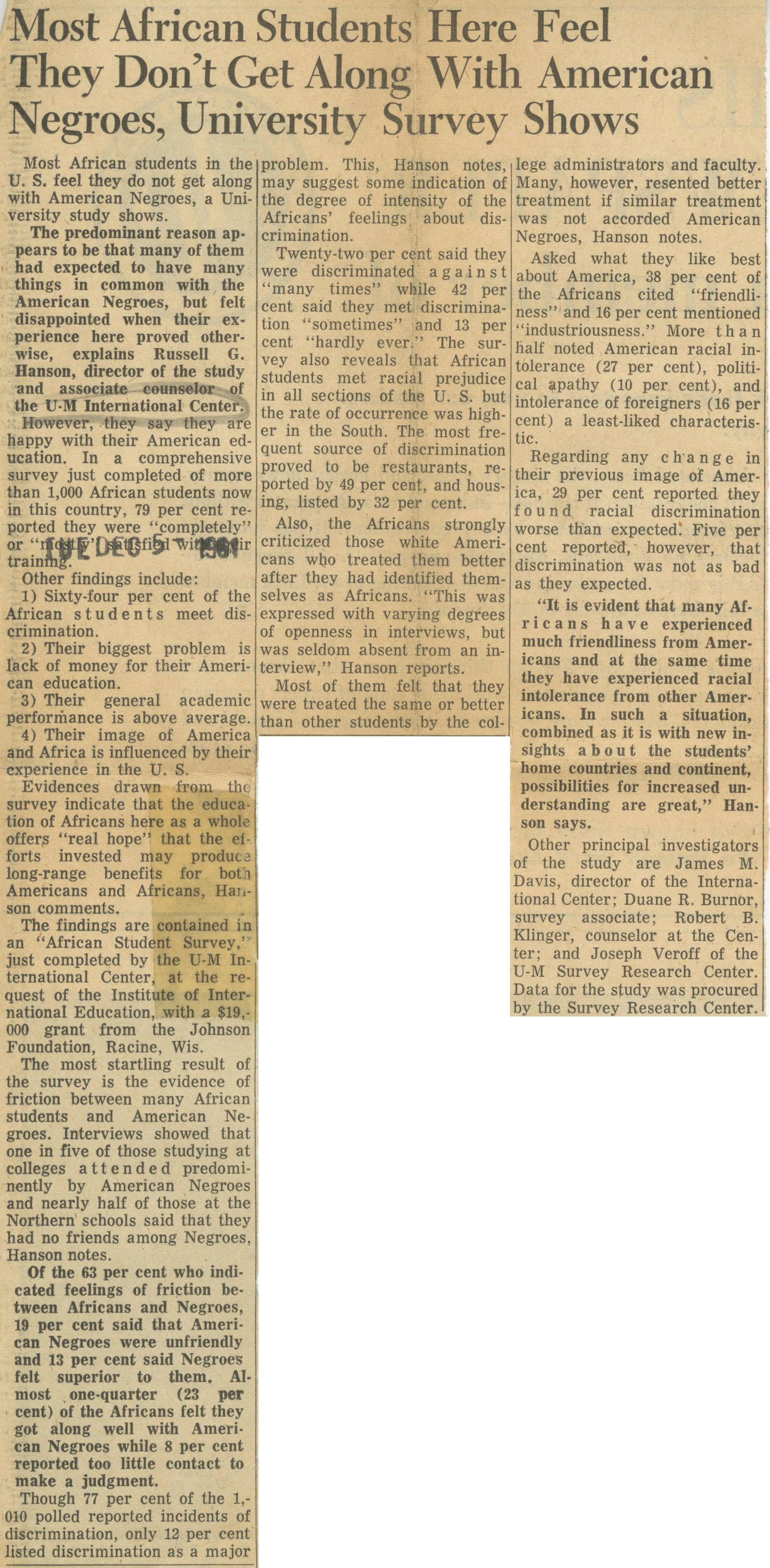Most African Students Here Feel They Don't Get Along With American Negroes, University Survey Shows

Most African students in the U. S. feel they do not get along with American Negroes, a University study shows.
The predominant reason appears to be that many of them had expected to have many things in common with the American Negroes, but felt disappointed when their experience here proved otherwise, explains Russell G. Hanson, director of the study and associate counselor of the U-M International Center.
However, they say they are happy with their American education. In a comprehensive survey just completed of more than 1,000 African students now in this country, 79 per cent reported they were “completely” or “mostly” satisfied with their training.
Other findings include:
1) Sixty-four per cent of the African students meet discrimination.
2) Their biggest problem is lack of money for their American education.
3) Their general academic performance is above average.
4) Their image of America and Africa is influenced by their experience in the U. S.
Evidences drawn from the survey indicate that the education of Africans here as a whole offers “real hope” that the efforts invested may produce long-range benefits for both Americans and Africans, Hanson comments.
The findings are contained in an “African Student Survey,” just completed by the U-M International Center, at the request of the Institute of International Education, with a $19,000 grant from the Johnson Foundation, Racine, Wis.
The most startling result of the survey is the evidence of friction between many African students and American Negroes. Interviews showed that one in five of those studying at colleges attended predominantly by American Negroes and nearly half of those at the Northern schools said that they had no friends among Negroes, Hanson notes.
Of the 63 per cent who indicated feelings of friction between Africans and Negroes, 19 per cent said that American Negroes were unfriendly and 13 per cent said Negroes felt superior to them. Almost one-quarter (23 per cent) of the Africans felt they got along well with American Negroes while 8 per cent reported too little contact to make a judgment.
Though 77 per cent of the 1,010 polled reported incidents of discrimination, only 12 per cent listed discrimination as a major problem. This, Hanson notes, may suggest some indication of the degree of intensity of the Africans’ feelings about discrimination.
Twenty-two per cent said they were discriminated against “many times” while 42 per cent said they met discrimination “sometimes” and 13 per cent “hardly ever.” The survey also reveals that African students met racial prejudice in all sections of the U. S. but the rate of occurrence was higher in the South. The most frequent source of discrimination proved to be restaurants, reported by 49 per cent, and housing, listed by 32 per cent.
Also, the Africans strongly criticized those white Americans who treated them better after they had identified themselves as Africans. “This was expressed with varying degrees of openness in interviews, but was seldom absent from an interview,” Hanson reports.
Most of them felt that they were treated the same or better than other students by the college administrators and faculty. Many, however, resented better treatment if similar treatment was not accorded American Negroes, Hanson notes.
Asked what they like best about America, 38 per cent of the Africans cited “friendliness” and 16 per cent mentioned “industriousness.” More than half noted American racial intolerance (27 per cent), political apathy (10 per cent), and intolerance of foreigners (16 per cent) a least-liked characteristic.
Regarding any change in their previous image of America, 29 per cent reported they found racial discrimination worse than expected. Five per cent reported, however, that discrimination was not as bad as they expected.
“It is evident that many Africans have experienced much friendliness from Americans and at the same time they have experienced racial intolerance from other Americans. In such a situation, combined as it is with new insights about the students’ home countries and continent, possibilities for increased understanding are great,” Hanson says.
Other principal investigators of the study are James M. Davis, director of the International Center; Duane R. Burnor, survey associate; Robert B. Klinger, counselor at the Center; and Joseph Veroff of the U-M Survey Research Center. Data for the study was procured by the Survey Research Center.